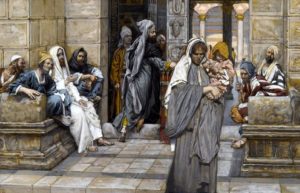Thoughts on Sunday’s Lessons for Nov. 7, 2021
First Reading (Track One): Ruth 3:1-5; 4:13-17
Ruth, the young Moabite widow introduced in last week’s first reading, has settled in Bethlehem with her widowed Israelite mother-in-law, Naomi.

Le denier de la veuve (The Widow’s Mite). Watercolor painting on graphite (1886-1894) by James Tissot (1836-1892). The Brooklyn Museum.(Click image to enlarge.)
In the tough world that widows and orphans faced in those times, one of them needs to find a husband to save the family from poverty. Through a bit of trickery suggested by Naomi, Ruth persuades her kinsman Moab to marry her. It works, and they have a child named Obed. Why is this little story placed in context with the books about Israel’s kings? The final verses unveil the answer: Obed will be the grandfather of King David, and thus he and his parents are in the genealogical line of Israel’s Messiah.
First Reading (Track Two): 1 Kings 17:8-16
Our Track Two readings start with the story of a poor widow who answers a difficult call from the Prophet Elijah. Both Lectionary tracks conclude with Mark’s story about another widow, the poor but generous woman who, in Jesus’ parable, gives all that she has to the Temple treasury. In this first reading, we hear of a widow who trusted God’s promise and shared her meager fare with Elijah, even though she had so little to eat that she believed she and her son would soon die of starvation. God provided, and her tiny portion of oil and meal proved sufficient to feed them all until the drought and famine ended.
Psalm (Track One): Psalm 127
Psalm 127 delves into ideas of maintaining home and family that resonate with the story of Ruth. In the ancient Near East, it was difficult for a family to survive without strong sons to build the home, grow crops, and protect the family from invaders. Sons like these are gifts that can come only as a blessing from God, says the Psalmist. God builds the house, watches over the city like a watchman keeping vigil, and provides children as a gift to God’s people, a quiver full of God-given arrows to help protect against enemies.
Psalm (Track Two): Psalm 146
“Praise God, O my soul!” This ringing hymn of praise begins the first of the final five Psalms, a collection that concludes the book with powerful tones of exultation in God’s greatness. But after the first joyous verse its tone shifts to a theme of caution: Take care, for while God can always be trusted, earthly rulers cannot. We can count on God, our creator, to give hope to widows and orphans; help for the poor, justice for the oppressed, freedom for the prisoner, and help for those who are disabled, to those who are alone, and to strangers in strange lands.
Second Reading: Hebrews 9:24-28
The letter to the Hebrews continues in its extended elevation of the eternal sacrifice of Jesus, as opposed what its writer sees as the more transient sacrifices of the old Temple’s earthly high priests. The earthly high priest had to come back to the sanctuary every year to atone for his sins. This animal sacrifice was repeated over and over again “with blood that is not his own.” But Jesus, the letter goes on, having borne the sins of many, will appear a second time. He need not come to deal with sin – that has already been done in Jesus’s sacrifice once and for all – but to save his faithful people.
Gospel: Mark 12:38-44
Jesus has arrived in Jerusalem on his final journey, and he is challenging the religious and political establishment in ways that will turn them angrily against him. First he scorns the scribes for their arrogance and hypocrisy. He mocks them for flaunting their wealth and power with ostentatious dress and prayer while they “devour widows’ houses.” Then, as Jesus sits near the Temple treasury, watching believers make their donations, a poor widow appears. She has little, but in contrast with the scribes, she gives two small coins: all that she has. Jesus praises her, not for giving all that she had, but because she gave it from her heart. It was not the quantity but the quality of her giving that mattered.
